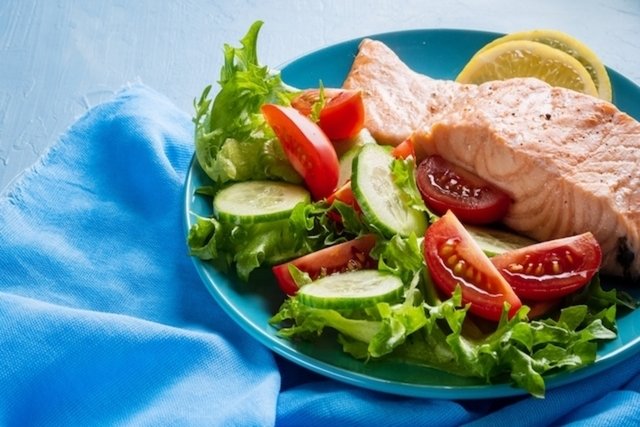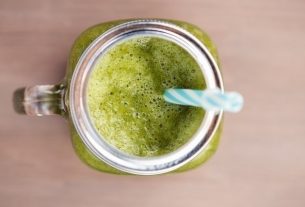The diet for irritable bowel syndrome should be easy to digest, avoiding the consumption of foods that stimulate the gastrointestinal mucosa, such as coffee and spicy foods, foods rich in fat and sugar, and regulating fiber consumption.
This diet may vary from person to person, because tolerance to food and the symptoms presented are not the same in everyone, and there may be interspersed periods of abdominal pain, constipation or diarrhea and bloating. Therefore, it is important to consult a nutritionist so that an assessment can be carried out and an individualized meal plan can be indicated.
In addition, it is also recommended to write down what you eat daily, to help identify which foods cause symptoms such as diarrhea, excess gas or constipation. Learn about other symptoms of irritable bowel syndrome.

Allowed foods
Foods that could help prevent crises and that can be included in your diet are:
- Fruits such as papaya, melon, strawberry, lemon, tangerine, orange or grapes;
- White or orange vegetables such as cabbage, chayote, carrots, pumpkin, zucchini, cucumber or lettuce;
- White meats such as chicken or turkey;
- Fish of any type, but prepared grilled, oven or steamed;
- Probiotic foods like yogurt or kefir;
- Eggs;
- Skimmed milk and lactose-free white cheeses, (if for any reason the person feels discomfort when consuming this type of product, it is recommended to avoid them);
- Plant-based drinks almond, oat or coconut;
- Nuts such as almonds, walnuts, peanuts, chestnuts and pistachios;
- Teas with digestive and calming properties, such as chamomile, linden or lemon balm, and should be taken without sugar;
- Oatmeal flouralmond or coconut to prepare bread, pies and cakes;
- Quinoa and buckwheat.
In addition, it is also recommended to drink between 1.5 and 3 liters of fluids per day, including water, soups, natural juices and teas, which allows the stool to become more hydrated and, thus, it is possible to avoid constipation. or dehydration in case of diarrhea.
It is important to mention that these foods may vary if the person has gluten intolerance, allergy or sensitivity to a food or lactose intolerance.
Other nutritional recommendations
To alleviate the discomfort that occurs in irritable bowel syndrome, it is important to eat several times a day and in smaller quantities, chew food well, avoid skipping meals and practice physical activity regularly to promote bowel movements.
Furthermore, it is recommended to limit fruit consumption to 3 servings per day and 2 servings of vegetables, as well as avoiding excessive consumption of resistant fibers, which are fibers that are not completely digested by the body, which causes them to be fermented. and increase the production of intestinal gases.
Food should be cooked simply and with few condiments, and the use of aromatic herbs should be preferred to flavor the food.
See, with nutritionist Tatiana Zanin, other tips for irritable bowel syndrome:
Foods for moderate consumption
The consumption of foods rich in fiber should be moderate and may vary from person to person depending on the symptoms present and the person’s tolerance for this type of food.
There are two types of fiber: soluble and insoluble. Most plant foods contain a mix of both types, although some foods have a higher proportion of one type of fiber than the other. In the case of irritable bowel syndrome, ideally the largest portion should be soluble fibers, as they tend to produce less gas.
For this reason, the foods listed below should be consumed in moderation and, if possible, avoided:
- Cereals, such as rye, brown rice, corn, oats and whole grain pasta;
- banana verde
- Legumes such as lentils, beans, chickpeas, asparagus and peas;
- Vegetables such as Brussels sprouts, broccoli, onion and garlic.
This type of fiber can have benefits if a person has constipation, and should not be consumed in excess. On the other hand, if the person has diarrhea, the consumption of these foods is not recommended.
Foods that should be avoided
In the irritable bowel syndrome diet, it is important to avoid foods that are stimulants such as coffee, chocolate, energy drinks, black tea and green tea, and the consumption of alcoholic beverages and foods with artificial colors is also not recommended.
Seasonings such as pepper, meat broth, sauces and foods with a high fat and sugar content such as fried foods, sausages, red meat with a lot of fat, yellow cheeses and frozen ready-made foods such as nuggets, pizzas and lasagnas should also not be consumed.
These foods inflame and cause irritation of the intestinal mucosa, causing the appearance or worsening of symptoms such as diarrhea or constipation, gas, cramps and abdominal pain.
Example menu for 3 days
The following table shows an example of a 3-day menu to control irritable bowel syndrome:
The amounts and types of food recommended vary, as the disease can present itself to different degrees depending on each person.
Therefore, it is important to consult a nutritionist to recommend a nutritional plan adapted to individual needs, in addition to following the diet until you discover which foods can be included, which should be consumed in smaller quantities and which should be definitively avoided.
What is the FODMAP diet?
To find out which foods should be avoided, a nutritionist or doctor may recommend following a FODMAP diet. In this diet, foods are classified into several groups, such as those containing fructose, lactose, oligosaccharides and polyols.
These foods are poorly absorbed in the small intestine and quickly fermented by bacteria and, therefore, when they are restricted from the diet, they help to alleviate the symptoms of irritable bowel syndrome.
Initially, foods are restricted for a period of between 6 and 8 weeks and then, little by little, they can be introduced by group and the body’s reaction is observed. See the FODMAP diet in more detail.

Sign up for our newsletter and stay up to date with exclusive news
that can transform your routine!
Warning: Undefined array key "title" in /home/storelat/public_html/wp-content/plugins/link-whisper-premium/templates/frontend/related-posts.php on line 12
Warning: Undefined array key "title_tag" in /home/storelat/public_html/wp-content/plugins/link-whisper-premium/templates/frontend/related-posts.php on line 13



